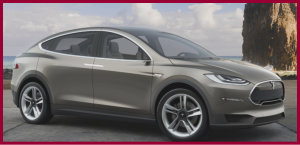
The Model X Crossover is due in 2014 as a brand extension. Tesla is on track to sell about 20,000 cars this year, if the fires don’t interfere.
Panasonic Corporation and Tesla Motors today announced that Panasonic will expand its supply of automotive-grade lithium-ion battery cells to Tesla. The two companies are changing their existing 2011 deal to now supply nearly 2 billion cells over the course of four years. Each of the largest Tesla battery pack uses 7,000 cells, so this about 300,000 vehicles in planned volume over the duration.
The announcement comes just after a second Model S fire this month was reported by the Diario de Yucatan. According to the Mexican newspaper, on 18 October a Model S hit a concrete highway barrier and burned to the ground. (Tesla Web Site Ignores Devastating Fire Coverage, Tesla Web Site Ignores Devastating Fire Coverage)
“We were able to contact the driver quickly and are pleased that he is safe,” said Liz Jarvis-Shean of Tesla in a statement. “This was a significant accident where the car was traveling at such a high speed that it smashed through a concrete wall and then hit a large tree, yet the driver walked away from the car with no permanent injury.”
The National Highway Traffic Safety Administration has thus far refused to investigate. The Tea Party terrorist shut down of the government had closed the safety agency for the first two weeks of October when the first Model S severely burned in Washington State after hitting road debris. That driver was also uninjured. Photos and videos of the accidents are available on the web.
After the first Tesla Model S fire, Elon Musk the founder wrote that EV is safer than gasoline fueled cars in a blog post. “The nationwide driving statistics make this very clear: there are 150,000 car fires per year according to the National Fire Protection Association, and Americans drive about 3 trillion miles per year according to the Department of Transportation. That equates to 1 vehicle fire for every 20 million miles driven, compared to 1 fire in over 100 million miles for Tesla. This means you are 5 times more likely to experience a fire in a conventional gasoline car than a Tesla!”
Under the expanded battery deal, lithium-ion battery cells purchased from Panasonic will be used to power the Model S as well as Model X SUV that is scheduled to go into production by the end of 2014.
“This expanded agreement with Panasonic is important to Tesla as we continue to increase the pace of production,” said Tesla Co-Founder and CEO Elon Musk. “We look forward to strengthening our relationship with Panasonic, and I’m confident that this partnership will continue to be an integral part of Tesla’s success for years to come.”

